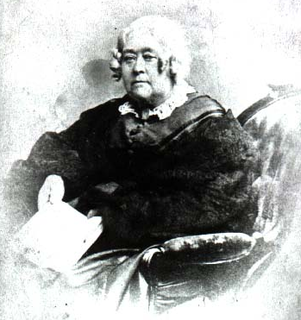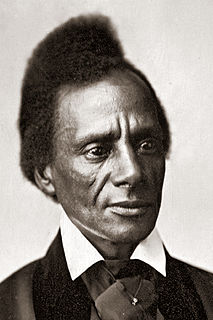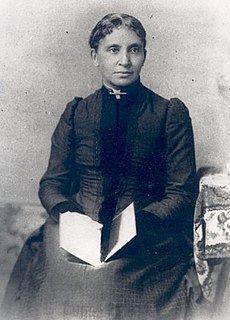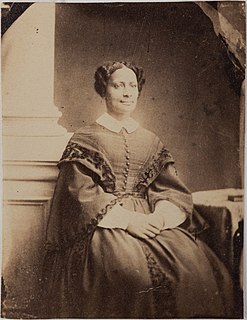
Middleton is a town in Essex County, Massachusetts, United States. The population was 9,779 at the 2020 census.

Salem is a historic coastal city in Essex County, Massachusetts, located in the North Shore region. Continuous settlement by Europeans began in 1626 with English colonists. Salem would become one of the most significant seaports trading commodities in early American history.

Elizabeth Palmer Peabody was an American educator who opened the first English-language kindergarten in the United States. Long before most educators, Peabody embraced the premise that children's play has intrinsic developmental and educational value.

Charles Lenox Remond was an American orator, activist and abolitionist based in Massachusetts. He lectured against slavery across the Northeast, and in 1840 traveled to the British Isles on a tour with William Lloyd Garrison. During the American Civil War, he recruited blacks for the United States Colored Troops, helping staff the first two units sent from Massachusetts. From a large family of African-American entrepreneurs, he was the brother of Sarah Parker Remond, also a lecturer against slavery.
Josephine St. Pierre Ruffin was an African-American publisher, journalist, civil rights leader, suffragist, and editor of the Woman's Era, the first national newspaper published by and for African-American women.

Charlotte Louise Bridges Forten Grimké was an African American anti-slavery activist, poet, and educator. She grew up in a prominent abolitionist family in Philadelphia. She taught school for years, including during the Civil War, to freedmen in South Carolina. Later in life she married Francis James Grimké, a Presbyterian minister who led a major church in Washington, DC, for decades. He was a nephew of the abolitionist Grimké sisters and was active in civil rights.

Sarah Parker Remond was an American lecturer, activist and abolitionist campaigner. Born a free woman in the state of Massachusetts, she became an international activist for human rights and women's suffrage. Remond made her first public speech against the institution of slavery when she was 16 years old, and delivered abolitionist speeches throughout the northeastern United States. One of her brothers, Charles Lenox Remond, became known as an orator and they occasionally toured together for their abolitionist lectures.

Ednah Dow Littlehale Cheney was an American writer, reformer, and philanthropist.

Caroline Osgood Emmerton (1866–1942) was a wealthy philanthropist from Salem, Massachusetts, USA, who established The House of the Seven Gables as a house museum also known as the Turner-Ingersoll mansion in 1908.

Florence Hope Luscomb was an American architect and women's suffrage activist in Massachusetts. She was one of the first ten women graduated from the Massachusetts Institute of Technology. Her degrees were in architecture. Luscomb became a partner in an early woman-owned architecture firm before work in the field became scarce during World War I. She then dedicated herself fully to activism in the women's suffrage movement, becoming a prominent leader of Massachusetts suffragists.

Harmony Grove Cemetery is a rural cemetery in Salem, Massachusetts. It was established in 1840 and is located at 30 Grove Street. The cemetery is approximately 35 acres in size and was designed by Francis Peabody and Alexander Wadsworth.

The New England Women's Club of Boston, Massachusetts, was one of the two earliest women's clubs in the United States, having been founded a couple of months after Sorosis in New York City.
African-American women began to agitate for political rights in the 1830s, creating the Boston Female Anti-Slavery Society, Philadelphia Female Anti-Slavery Society, and New York Female Anti-Slavery Society. These interracial groups were radical expressions of women's political ideals, and they led directly to voting rights activism before and after the Civil War. Throughout the 19th century, African-American women like Harriet Forten Purvis, Mary Ann Shadd Cary, and Frances Ellen Watkins Harper worked on two fronts simultaneously: reminding African-American men and white women that Black women needed legal rights, especially the right to vote.

Caroline Maria Seymour Severance (1820–1914) was an American abolitionist, suffragist, and founder of women's clubs.
This is a timeline of the history of the city of Salem, Massachusetts, United States.
Caroline Remond Putnam (1826–1908) was a prominent African-American businesswoman and abolitionist in Salem, Massachusetts. Along with two of her sisters, she owned and operated the largest wig factory in the state, making her mark on the growing field of hair-care products for African-American women.

Harriet Forten Purvis was an African-American abolitionist and first generation suffragist. With her mother and sisters, she formed the first biracial women's abolitionist group, the Philadelphia Female Anti-Slavery Society. She hosted anti-slavery events at her home and with her husband Robert Purvis ran an Underground Railroad station. Robert and Harriet also founded the Gilbert Lyceum. She fought against segregation and for the right for blacks to vote after the Civil War.
The Boston Women's Heritage Trail is a series of walking tours in Boston, Massachusetts, leading past sites important to Boston women's history. The tours wind through several neighborhoods, including the Back Bay and Beacon Hill, commemorating women such as Abigail Adams, Amelia Earhart, and Phillis Wheatley. The guidebook includes seven walks and introduces more than 200 Boston women.
Mary Morton Kehew was an American labor and social reformer. She was a president of the Women's Educational and Industrial Union, a trustee of Simmons College, and the first president of the National Women's Trade Union League. She was also active in the women's suffrage movement, and on behalf of the blind.
Amy Matilda Williams Cassey was an African American abolitionist and was active with the Philadelphia Female Anti-Slavery Society. Amy Cassey was a member of the group of elite African Americans who founded the Gilbert Lyceum, Philadelphia's first co-ed literary society. The society had more than forty registered members by the end of the first year.